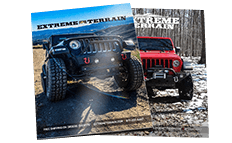Jeeps are the ultimate off-road machines and many people compare them to Lego sets because you can mix and match parts, add new parts, and customize it with accessories to your heart’s content. This makes most Jeep models a blank canvas for you to customize to your liking, and due to the long run time of JK models there is a lot of aftermarket support for them. We’re talking Jeep wheels, Jeep lift kits, new exhaust systems, and anything else you may need. While the JK generation (2007-2018) was one of the best generations to date, there are some things that could've been better, like a more modern interior, taller ride height, and better lighting. Even if you’re not looking to upgrade your vehicle, we carry plenty of replacement parts to ensure that your vehicle stays running for as long as possible. Explore JK Jeep Wrangler parts from trusted brands like RedRock, Bestop, K&N, Flowmaster, and more when you shop with ExtremeTerrain.
Jeep JK Accessories, Parts & Mods for 2007-2018 Wrangler
Interior Jeep JK (2007-2018) Parts and Accessories
If there's one thing that comes up short with Jeeps, it's the interior. They tend to lack technology, especially if you go back to some of the early JK models. Fortunately, at ExtremeTerrain, we carry a wide variety of Jeep JK accessories for your interior. We carry new touchscreen radios with Bluetooth technology, better speakers, additional lighting options, and even new seats for more modern comfort. Aside from replacement parts or customization options, you can't neglect the interior of your Jeep if you plan on taking it off the pavement. You'll need floor mats to protect the carpet and seat covers to keep your leather or cloth seats from water, mud, dirt, and other types of debris.
Exterior Jeep JK (2007-2018) Parts and Accessories
The best part about customizing a Jeep is transforming the exterior of your truck. Jeep JK parts for the exterior will help you personalize your vehicle to your liking with parts like new bumpers, wheels, grille inserts, and even window tints. These parts come in plenty of color options and you can really make your build pop with new lighting fixtures from headlights to hood-mounted fog lights. While you can customize the exterior of your vehicle, some parts can add utility to your vehicle. At ExtremeTerrain, we carry cabin covers, extended covers, and bikini tops that will help you experience as much or as little or the outdoors as you want. We also carry winches, tow hooks, and other utility accessories that will get you out of trouble if you go a little too far off the road.
Performance Jeep JK (2007-2018) Performance Parts and Accessories
Customization options for your vehicle extend far beyond interior and exterior parts and things get a little more intense once you start getting under the hood. Jeep JK mods for performance will help you squeeze more power out of your engine to help you get better results off-roading or on the pavement. Cold air intakes, intake manifolds, exhaust parts, and even forced air induction can help you add a lot of power to your vehicle’s engine. At ExtremeTerrain, we also carry fuel injection replacement options, better fuel pumps, and other supporting components to help you maximize your vehicle’s performance. Aside from power, if you want your Jeep to perform better off-road, you also have to look at the suspension. At ExtremeTerrain, we have you covered with lift kits, big wheels, better tires, and supporting parts including shocks, struts, and springs. If you ever have trouble finding the parts that work best for your build, speak with our sales techs to determine what parts work best together. Then, purchase the parts you need online for fast and convenient shipping.
Carrying on a long tradition of thrilling off-road adventure, the JK generation of Jeep Wranglers roared off the production line and into showrooms starting with the 2007 model year, and concluding in 2018. All Jeep JKs have the same basic rugged, terrain-conquering build, plus a robust frame to cope with the most boulder-strewn trails.
The 2007 launch of the Jeep Wrangler JK was a thorough renovation, bringing this all-time favorite into the 21st century while keeping all the features that define a Jeep. Based on two different wheelbases – a short 96.4 inch wheelbase for 2-door versions and a 116 inch wheelbase for the 4-door Unlimited – the JK has a 5.5 inch wider chassis that increases stability and offers more space inside to bring along extra friends or your entire family.
At the same time, the Jeep JK now boasts power windows and locks (powered by snap connectors that disconnect neatly when the doors are removed), a navigation system, ABS brakes for on-road and off-road use, and brake lock differentials. These boxy, modular 4x4s remain perfectly adapted to all kinds of aftermarket upgrades – extra lights, winches, robust front bumpers, additional storage, and so on – such as the high quality Jeep JK parts offered by ExtremeTerrain.
As far as the heart of the Jeep JK is concerned, we have the 3.8L V6. Consider it a bored out and stroked version of Chrysler’s 3.3L V6 engine. The first iteration of the 3.8L (2007-2011) makes about 202 horsepower and 237 ft/lbs of torque. There was some apprehension about Jeep’s decision of adopting this engine, but don’t let hearsay dissuade you from this generation of Wrangler. The main differences between the V6 and previous 4.0L is the V6 makes its power a tad higher in the RPM line. If you’re familiar with driving the 4.0L and convert to the 3.8L, you’ll noticed the engine prefers to be about 700 RPM higher at highway speeds than its predecessor. In 2012, Chrysler introduced a different engine to the Jeep JK lineup, the 3.6L. Yes, it is a smaller engine, but it has a substantial power bump from the 3.8L. The 3.6L Pentastar V6 makes 285 horsepower and 260 ft/lbs of torque.
Common engine parts for the JK are cold air intakes, more powerful ignition components (to handle the stress of winching), and tuners (to compensate for rear gear changes and tire size changes). If you’re looking to get a little more power out of your rig, a cold air intake is an excellent place to start. If the slight bump isn’t enough, there’s always the full supercharger kits, but they take more mechanical know-how to install and weekend’s worth of time if you plan on tackling such a mod yourself.
All 2007-2018 Wrangler JKs include a standard 6-speed manual transmission with a 5-speed automatic option. The 2018 JK launches from that foundation with exciting upgrades – ranging from standard Dana 44 front and rear axles and 33-inch all-terrain tires on the Rubicon, to premium tan soft tops on the Golden Eagle, Freedom, and Altitude editions. The Golden Eagle edition’s unique aesthetic details include bronze trim and wheels and luxurious leather seats. The Willys Wheeler and Freedom editions feature an optional push-button locking rear differential. When not engaged, the electronic differentials behave as open differentials. In comparison to the TJ, the JK drivetrain is a stronger, more reliable system to tackle off-road adventures.
Another feature introduced to the Jeep Wrangler JK is push-button, sway bar disconnectors. Needless to say, this is a great boon to us off-roaders. Rather than hitting the trail, stopping, getting out of your rig and manually disconnecting your sway bars, you can be trail ready with a push of a button. Just remember to reengage your sway bars before returning to pavement, otherwise you’ll run into drivability and stability issues.
Upgrading this already robust system might seem fruitless. However, like any factory build there’s always room for improvement and the JK is no exception. The Jeep JK parts you’ll see available on our digital shelves are designed to enhance your off-roading experience while adding durability to your rig. Air lockers, for example, are even beefier than the electronic units, but you’ll have to install an onboard air system to work them properly. Swapping out your rear gears for a set that can better handle your larger, heavier, off-roading tires is a common subject amongst Jeepers. Replacing the differential cover for a hardier version that slides off rocks instead of suffering a puncture will help ensure you make it home without the need for an embarrassing tow. Lastly, if your considering lifting your Jeep JK (and who wouldn’t), if you lift your suspension more than three inches you’ll need an aftermarket driveshaft to compensate for the change in drivetrain geometry. Otherwise you’ll start wearing out parts early, and might even break something while out on the trail.
Breaking parts on the trail might not be a new experience for most of us, but Chrysler took the off-roading community’s habits into consideration when designing the Jeep JK fenders. Although the overall JK platform is more robust than the TJ, the JK features breakaway fenders. When these fenders come in contact with an obstacle, they flex and contort to avoid damaging other components such as your JK’s tub. Should they flex too much, they will break apart, leaving fragments behind. This is a significant improvement over the TJ steel fenders as replacing the plastic JK fenders is cheaper and easier than fixing dents in steel. Most aftermarket 2007-2018 Jeep JK Fenders are also plastic, but there are aluminum and steel options if breakaway fenders aren’t your thing. Keep in mind aftermarket fenders are usually designed with trail riding in mind as well as added width to keep you legal with wider tires. Should the fenders breakaway, your tires will be the next point of contact for side impacts.
Speaking of plastic components, some will argue the 2007-2018 Jeep JK front bumper is no different than the TJ’s plastic unit, but consider this. If Jeep released steel, winch ready bumpers how much higher of a price would Chrysler demand for a new Wrangler? Also consider how many Wrangler owners upgrade their front bumpers as their first mod. Keeping the stock bumper is a rarity when there are so many other options to suit someone’s build preferences. From modular, stubby front bumpers to full length bumpers complete with winch mount, upgrading your Jeep JK front bumper is a staple part of owning a Wrangler.
The 2018 JK is a great platform for modding, and ExtremeTerrain has all the top-quality parts you need to turn your new Wrangler into a cross-country powerhouse, including winch bumpers, off-road lighting, body armor, fender flares, and many more excellent Jeep JK parts to maximize your Jeep’s potential!
Wrangler JK Overview – Don’t Knock It Before You Try It
If you’ve been a Jeep owner for any length of time, I’m sure you will have heard or even shared your own complaints about the third incarnation, the Jeep Wrangler JK. I am an avid Wrangler enthusiast, and I have owned every base model, including a 1947 CJ2 that is almost at rock crawler status. Yes, I’ve owned the CJ5, CJ7, YJ, TJ, and the new JK. I speak from experience when I say I was reluctant to buy the newest model. It was just too… clean. It had 4 doors. My Jeep friends said it was the equivalent of a school bus or a fake minivan.
After rescuing one of those friends on the Rubicon Trail, the complaints, and my doubts, vanished. If you hate the JK it's likely you have spent a lot of money on your TJ and perhaps just a tad bit too much time listening to opinionated members of Jeep forums.
Get behind the wheel before you judge, and I’m not talking about a spin around the mall. The capability of the JK Wrangler is astounding. It is more capable off-road, more comfortable in general, and is actually a bit cheaper than the previous models. After having driven my JK over the Rubicon Trail, I know exactly what these things are capable of. Plus, if you compare a JK with a 3.5” lift to a 3.5” lifted YJ or TJ, you will see the JK has a higher break-over angle and clearance with the same amount of lift. Still not convinced? I will now debunk some of the common misconceptions of the JK.
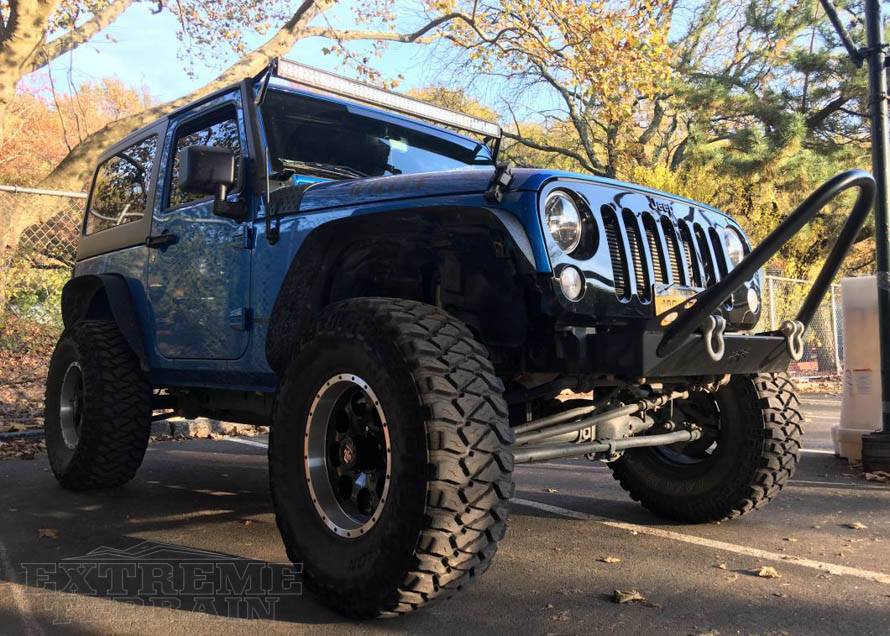
JK with a 2.5in Lift
Common Misconceptions
I often hear from fellow Jeepers is it’s too large. The reality is the JK is 5 inches wider than the TJ, but that only adds 2 & 1/2 inches on each side. I’ve not been to a trail where this increase would stop you. If it gets tight, just fold in the mirrors and let the flexible breakaway fenders absorb some of the trail. If tight trails are in your future get the two-door, but if you want to comfortably bring your friends and family on difficult trails, get the four-door.
On that note, people don’t like the cheapness of the new plastic front fenders. For those running a mall crawler I see the argument, but when you do some serious wheeling, you will be glad they are there. They are MUCH cheaper to fix than the TJ's painted steel fenders. Plus allowing the breakaway causes little or no collateral damage to the grille, tub, and internal structure like the TJs fenders caused during heavy wheeling. Interestingly, the JK is the first Jeep introduced where they took the aftermarket into consideration. To bring the price of the vehicle down, less expensive components were used in nonessential areas they knew would be upgraded anyway. The bumpers are a perfect example of this. My friend complained the plastic bumpers are stupid and weak, but so are the TJ's. How many TJs are still out there with the factory bumpers? That’s the joy of the Jeep: aftermarket bumpers are the norm.
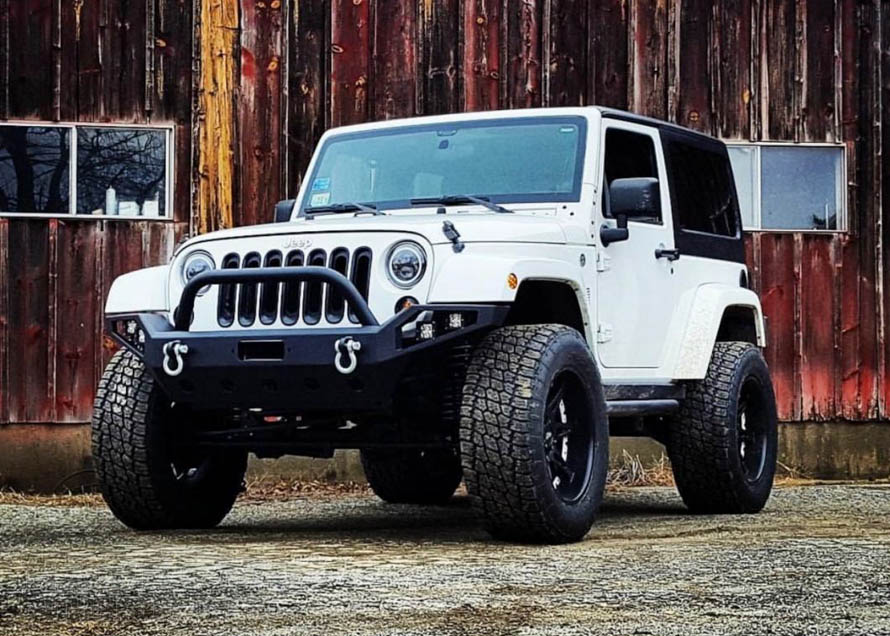
JK with a Full Width Aftermarket Bumper
The Wrangler JK’s Motor
I was told using the minivan 3.8L OHV V6 was a bad choice, and I fell prey to this misconception. My recent research has shown some statistics that might surprise you: The new V6 makes its power at a slightly higher rpm than the retired 4.0L inline. Typically, you will drive the V6 about 700 rpm higher than the inline when on the highway. The 4.0L is a great engine, but even it has problems, such as cracked exhaust manifolds. Plus, it runs lean at wide-open throttle. The V6 will still start in low-range first gear and idle up a hill whereas the inline will not. The 4:1 gearing in the Rubicon transfer case works better with the 3.8 V6 than it does with the 4.0 inline. In the sand and mud, the higher-revving V6 seems to have the advantage as well. These arguments are moot however with the addition of the 2012 3.6 Penstar which brings an extra 85 HP, better MPG, and higher torque. Enough said.
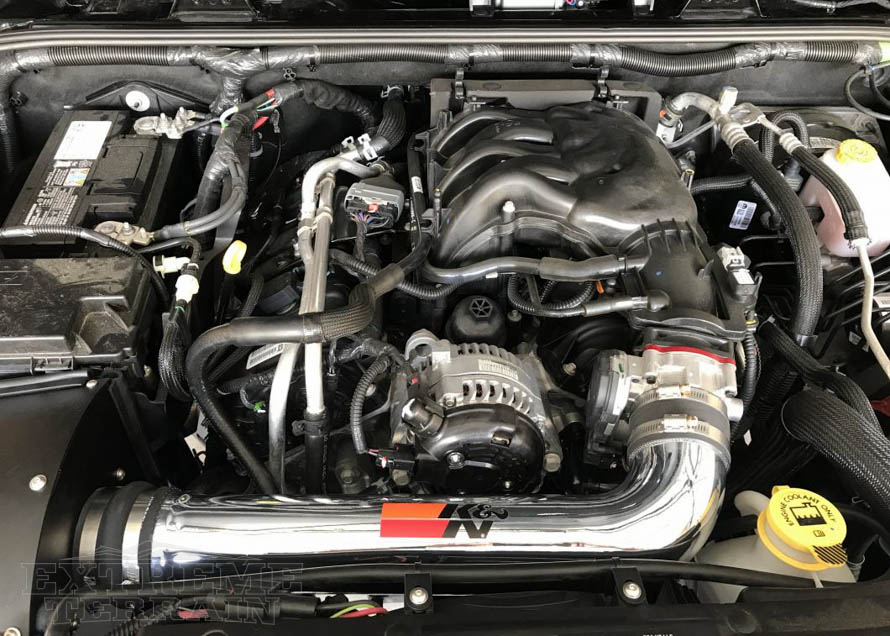
3.6L Engine Bay
The Advantages of the JK's Drivetrain
Some people feel the new electric lockers are garbage. In my personal and highly tested opinion, I’ve never had a problem with them. According to official specs, the JK axle housings, shafts, and gears are all stronger than the TJ's. When disengaged the rear JK Rubicon locker is open, whereas the TJ has is a limited slip locker. Given the choice, I’d prefer strength and durability to the limited slip.
The Jeep Wrangler and Wrangler Unlimited JK have added some features that make it overall a better buy then previous models. The push-button sway-bar disconnect on the Rubicon model is amazing. It helps provide more suspension articulation and a smoother ride off-road. Jeep should have thought of this sooner. Front and rear lockers, plus a sway bar disconnect, come standard on some models and makes wheeling that much more pleasurable. Plus, the new rocker guards are hands down the best Jeep has ever built (Rubicon only). I didn’t even switch mine out. I added an aftermarket weld on kit to extend the protection.
Please don’t get me wrong. I love my older Jeeps. Especially the way they look. But don’t think for a second the JK is anything less than a serious off road beast because there may be a day when a JK rescues you on the trail.
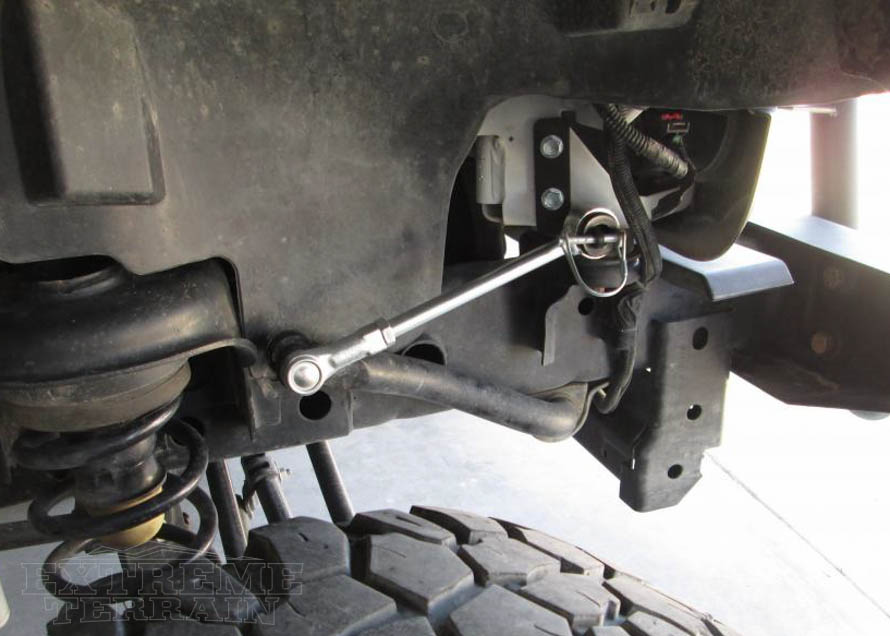
Onto the Submodels – an Overview
- Find out what does LWB and SWB mean
- How does wheelbase affect handling
- Classic 2 door look or 4 door space
- What are Rubicon models
- Should I get the 3.8L or 3.6L
Basic Wrangler JK Pros & Cons
The 2 door JK has a few key advantages for off-roading when compared to the Unlimited model: less weight and short wheel base. With its lighter weight, the JK’s engine won’t work as hard as it would in the JKU which gives a feeling of increased performance. The short wheel base or SWB allows for a lower turn radius and a better break over angle. The lower turn radius gives you more agility in tight trails and rocky corridors while the break over angle will allow your Wrangler to tackle sharper, more rugged terrain.
Like with anything, there’s always a bad side. The JK is no exception. The JK isn’t a bad rig but at highway speeds the JK Unlimited is noticeably more stable with its longer wheelbase. The JK is also less stable when crawling up a hill. The shorter wheelbase increases your chances of flipping over. The JK is not able to tow as much as the Unlimited model which can make or break your decision. Do you want to tow all your toys or just some?
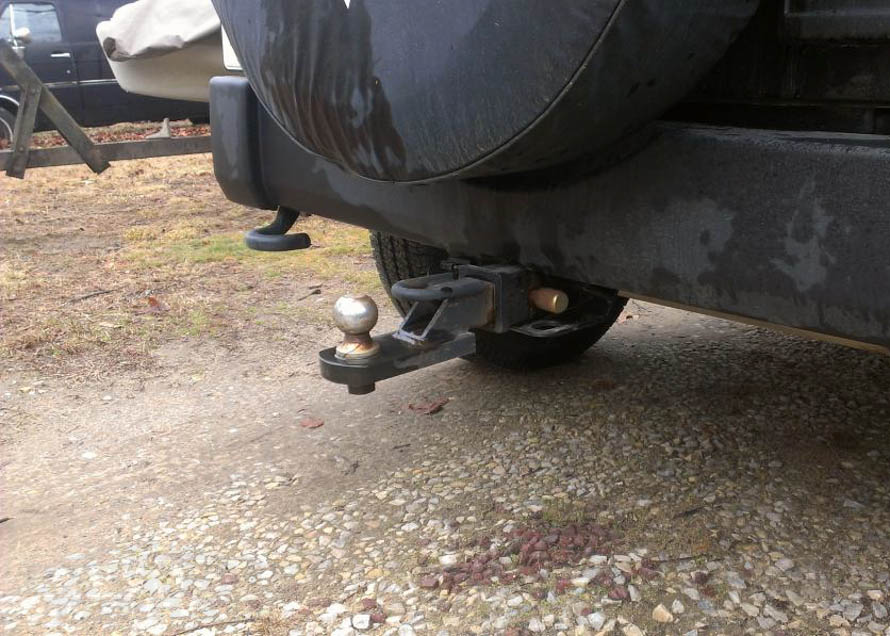
3,500lb Receiver Hitch
Jeep Wrangler JKU: Pros & Cons
The JKU is the 4 door version of the Wrangler; it is also the only 4 door Wrangler as of now. The Unlimited, or U version, is a great alternative to the typical two door Wrangler.
Some people don’t enjoy change. Some Wrangler enthusiasts may not enjoy the JK ‘sedan’ but don’t let this stop you. The JKU is just as capable if not more so than the JK, and it has a better tow rating. The JKU has a much longer wheel base (LWB) to accommodate for the 2 extra full sized doors. The JKU also has the ability to tow 1,500 lbs more than the JK due to its LWB stability.
Since the JKU has a longer wheelbase, it also has a wider turning radius. The radius is increased from the JKs 34.9 feet to 41.2 feet. This makes the JKU a bit less nimble than the smaller JK. The JKU also has a few pounds extra which makes the engine work that much harder than the lighter 2 door. The Unlimited’s break-over angle is subpar to the JK which may not work out well on very sharp terrain.
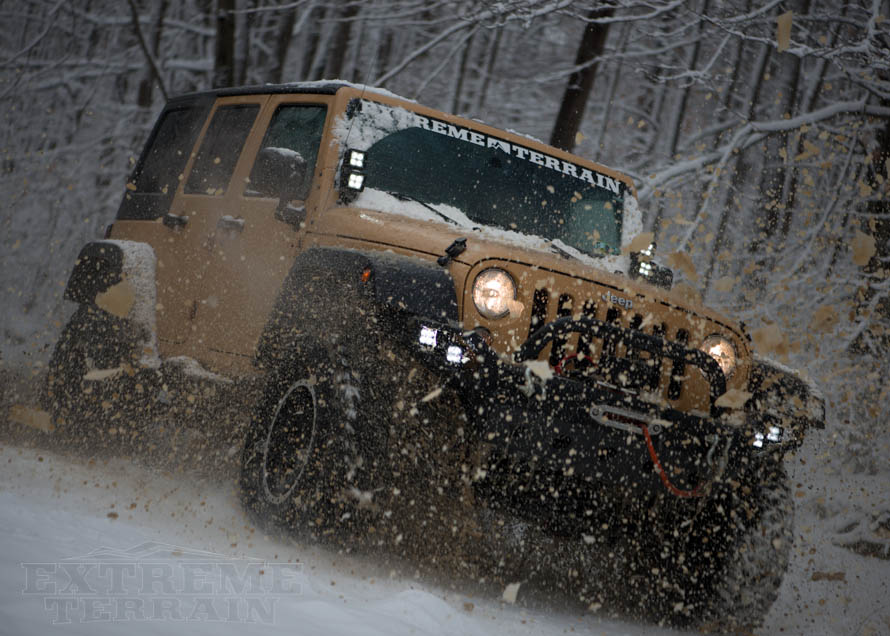
JK Wrangler Rubicon
Rubicon models are the ultimate version of the factory JK. They are equipped with Mopar accessories, off-road suspension, and many other mods that make the already great Wrangler an off-road beast. This model JK or JKU is also roughly 2.5 inches taller than the stock version with the help of off-road accessories like springs, shocks, sway bars, links, wheels, tires, and armor. A section of the Rubicon trail was used to perfect, test Wrangler models, and add on components. If you’re in the market for a Rubicon there’s no way to go wrong.
Rubicon 10th Anniversary Hood
The Wrangler 3.8 EGH V6 vs. 3.6L Pentastar V6
The 2007-2010 Jeep Wranglers came equipped with the EGH 3.8L pushrod V6. This engine is a bored and stroked version of the 3.3 V6 from the Chrysler group vehicles of the past. The 3.8L was designed in the 80s, but it has been updated throughout the years. The 3.8L in the early Wrangler models came with roughly 202 hp with a nice 237 ft/lbs of torque. The 3.8L engines were mated with the optional automatic 42RLE Chrysler group transmission which includes electronic shift control, adaptive memory, and an electronically modulated converter clutch.
The newer, smaller, yet more powerful, 3.6L Pentastar V6 is what comes in the 2012-current Jeeps. It has 285 horsepower and 260 pound feet of torque. The Pentastar engine was made to replace the aging EGH. Now the 3.8L is no slouch, but the Pentastar makes more power, includes variable valve timing, and is designed with new age technology. The 2012 and up model 3.6L equipped Wranglers have a Mercedes Benz sourced transmission, the 5G-Tronic automatic transmission. All JKs share the standard Chrysler/Mercedes made NSG370 stick shift.
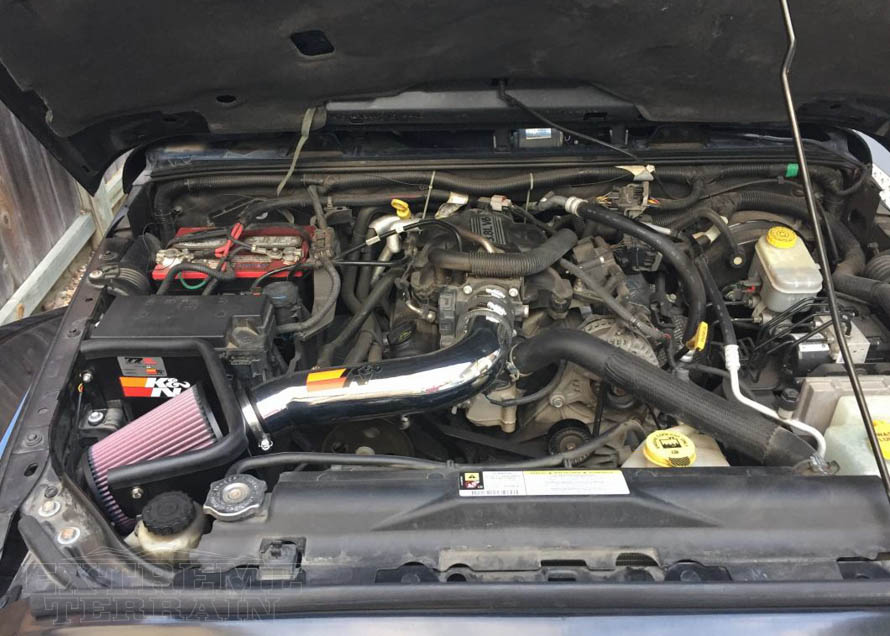
3.8L Engine Bay
Quick Review of the Special Editions
Chrysler offered the Islander, Mountain, Call of Duty, and Sahara as just a few of the many different sub-models of the JK. Each sub model features a different combination of suspension, drivetrain parts (lockers etc), accessories, and exterior paint and graphics to make each a bit unique and perfect for the buyer. All JKs do share the internal engine and main drivetrain components.
The Wrangler JK and U
JKs are a great rig for anything. JKs are made to tackle trails and be a daily driver. JKs are very capable off-roaders and have awesome features. When deciding JK vs JKU, go with what you want, but either rig is great. Both Jeeps have almost identical approach and departure angles, but the JKs have a 4 degree advantage. The JKU does excel at towing with 3,500 maximum. 1,500 more than the 2 door. The JKU has more space and fold down seats, but the JK maintains the classic look.
Shop all Jeep Accessories & Parts
Shop Wrangler Parts by Year: 2018 Jeep Parts, 2017 Jeep Parts, 2016 Jeep Parts, 2015 Jeep Parts, 2014 Jeep Parts, 2013 Jeep Parts, 2012 Jeep Parts, 2011 Jeep Parts, 2010 Jeep Parts, 2009 Jeep Parts, 2008 Jeep Parts, 2007 Jeep Parts
"























